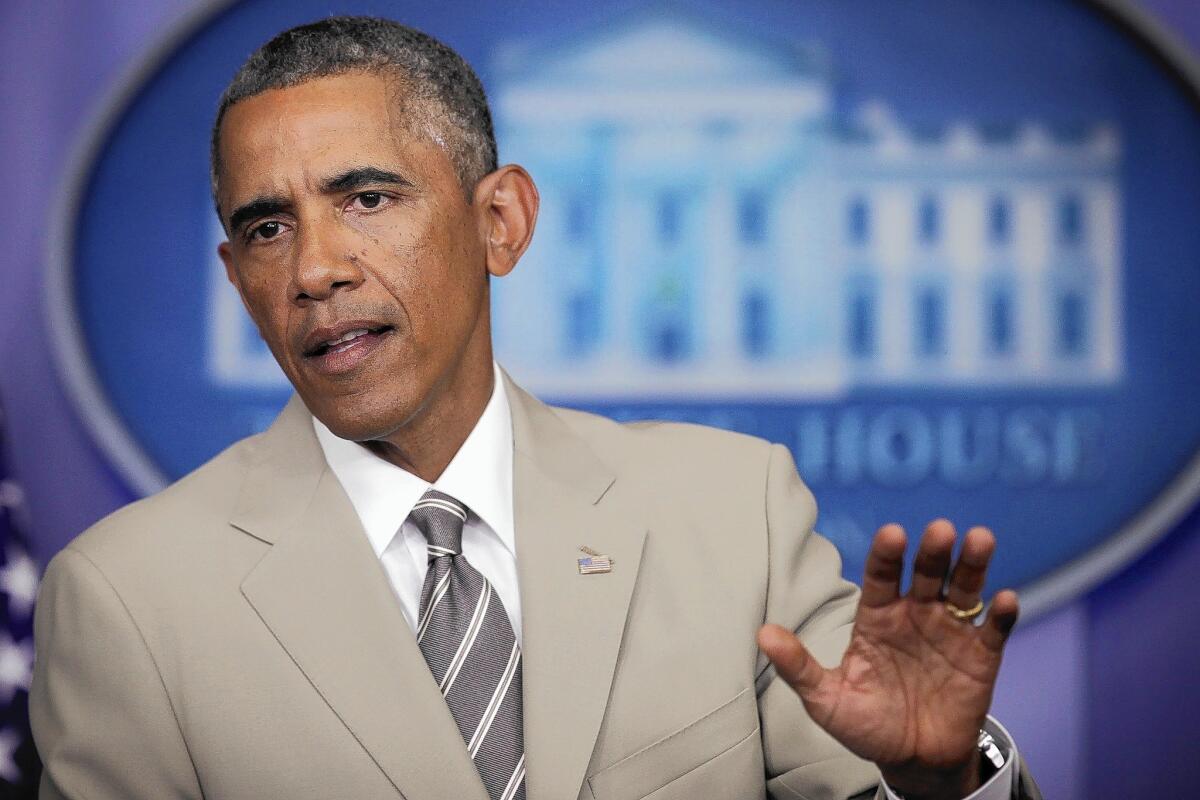Obama rules out military response to Russian moves in Ukraine

- Share via
Reporting from Washington — President Obama rebuffed pressure for quick U.S. action in two foreign crises Thursday, declining to label Russia’s military moves into Ukraine an invasion and saying that he was not ready to expand an air campaign against Islamist militants to Syria.
While pledging that the administration would penalize Moscow for opening a new front against Ukrainian forces, Obama ruled out U.S. military action and described the Kremlin’s moves as a continuation of a pattern rather than a new phase in the struggle between pro-Russia separatists and Ukraine’s government.
“We are not taking military action to solve the Ukrainian problem,” he said. “It is very important to understand that a military solution to this problem is not going to be forthcoming.”
Obama, who authorized military strikes in Iraq against the militant group Islamic State, said expectations that U.S. forces were about to broaden the 3-week-old campaign were premature because U.S. officials needed to continue planning, as well as build a coalition with regional governments and Sunni Muslim leaders.
“We don’t have a strategy yet,” he said in an appearance in the White House press room, emphasizing that the campaign was limited. “Folks are getting a little further ahead of where we’re at than where we currently are.”
That remark quickly drew criticism, and White House aides tried to clarify the comment, saying the president was referring only to one aspect of the strategy to take on the militants.
“Other parts of the president’s statement explicitly discussed the strategy against ISIL,” a White House official said, using one of the acronyms for the militant group.
“He’s just saying he hasn’t decided to take military action yet, which is what we’ve been saying for days,” added the aide, who requested anonymity in discussing the president’s remarks.
On Ukraine, where Russia moved more than 1,000 troops this week, Obama signaled that he would continue along his path of cooperating with Europe to gradually impose tougher sanctions.
He didn’t specify what new economic penalties he was considering, but said the possibilities would be discussed next week with European leaders during his trip to a North Atlantic Treaty Organization summit in Wales and to Estonia. U.S. sanctions thus far have mostly resulted in additional Russian provocation in Ukraine.
“My expectation is that we will take additional steps … primarily because we have not seen any meaningful action on the part of Russia to actually try to resolve this in diplomatic fashion,” he said.
The troop movements drew harsh condemnations from NATO and European government officials. Both British Prime Minister David Cameron and French President Francois Hollande described them as unacceptable.
Obama rejected the description of the Russian move as an “invasion,” saying that it was instead “a continuation of what’s been taking place for months now.”
The president apparently preferred to avoid the term, analysts said, because it suggests a violation of international rules that requires a response.
The U.S. envoy to the United Nations, Samantha Power, described the offensive to the U.N .Security Council as a “threat to the international order.”
Obama acknowledged that the separatists in eastern Ukraine were trained, armed and funded by Russia.
But he said that his goal was to apply increasing economic pressure on Russia in hopes that damaging its economy and isolating the country will force President Vladimir Putin to accept a negotiated solution.
The latest “incursion into Ukraine will only bring more costs and consequences for Russia,” Obama said.
He said he hoped that Europe, which has stronger economic ties to Russia, will agree to take part in increasing the economic pressure on the country.
He said he had spoken with German Chancellor Angela Merkel, who may be the European leader with the most influence with Russia, and that both agreed that Russia was behind the latest clashes.
The United States has an “unwavering commitment” to embattled Ukraine, Obama said.
But he also said that commitment had limits, noting that Ukraine is not a member of the NATO military alliance, in which an attack on one member is considered an attack on all.
Defense officials have been providing nonlethal aid to Ukraine, such as medical products, night-vision goggles and armored vests, and they are considering military training. That kind of assistance, and financial aid, will continue, U.S. officials said.
U.S. and European sanctions have already hit Russia hard, and they could be made more painful with more penalties for banks, and possibly for other sectors, such as transportation and mining.
Cliff Kupchan, an analyst with the Eurasia Group, said he believed the administration would be turning to the kind of harsh penalties it has imposed on Iran, which have largely cut off the country from much of world trade.
“I would expect them to start getting out the Iran playbook,” predicted Kupchan, a former State Department official.
The new Russian move into Ukraine brought pressure from some U.S. lawmakers for Obama to increase sanctions and intelligence sharing with Ukraine, and to begin to provide lethal aid as well.
Sen. Marco Rubio (R-Fla.) repeated his call for arms and “broad sectoral sanctions” against Russia. “The time for hollow rhetoric from Washington and European capitals passed long ago,” he said.
Times staff writers W.J. Hennigan, Kathleen Hennessey and Christi Parsons contributed to this report.
More to Read
Sign up for Essential California
The most important California stories and recommendations in your inbox every morning.
You may occasionally receive promotional content from the Los Angeles Times.











